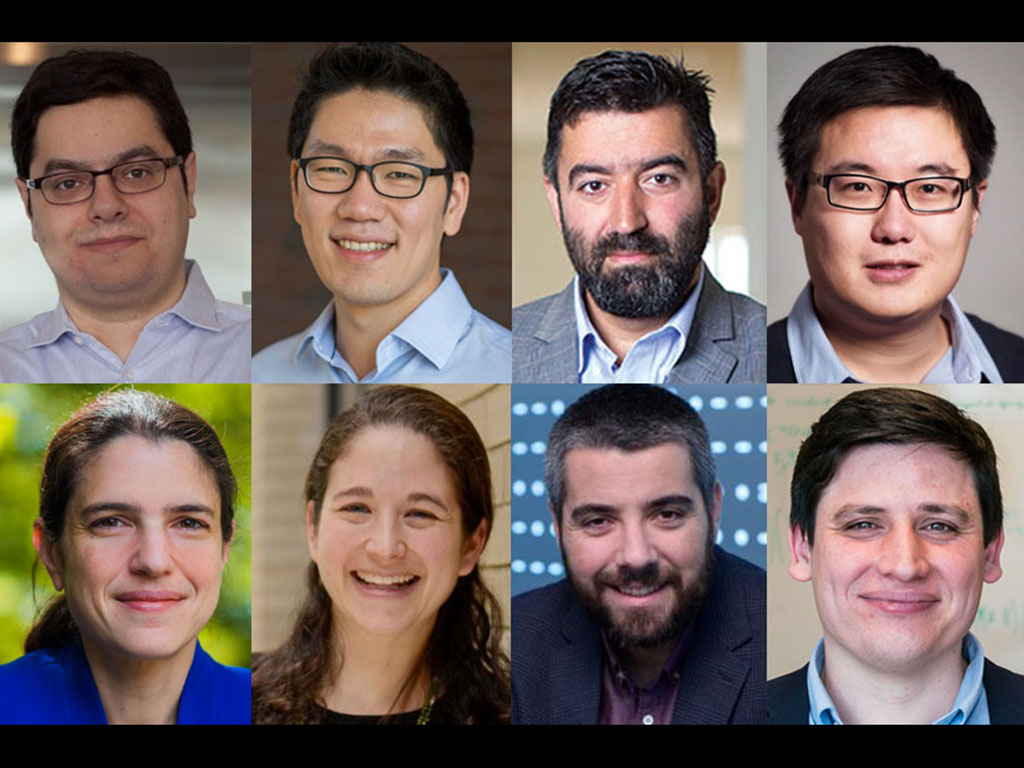The tenured engineers of 2021
The School of Engineering has announced that MIT has granted tenure to eight members of its faculty in the departments of Chemical Engineering, Electrical Engineering and Computer Science, Materials Science and Engineering, Mechanical Engineering, and Nuclear Science and Engineering.
“This year’s newly tenured faculty are truly inspiring,” says Anantha Chandrakasan, dean of the School of Engineering and Vannevar Bush Professor of Electrical Engineering and Computer Science. “Their work as educators and scholars has shown an incredible commitment to teaching and research — they have each had a tremendous impact in their fields and within School of Engineering community.”
This year’s newly tenured associate professors are:
Mohammad Alizadeh, in the Department of Electrical Engineering and Computer Science and the MIT Computer Science and Artificial Intelligence Laboratory, focuses his research in the areas of computer networks and systems. His research aims to improve the performance, robustness, and ease of management of future networks and cloud computing systems. His current research spans three areas of networking: learning-based resource management for networked systems, programmable networks, and algorithms and protocols for data center networks. He is also broadly interested in performance modeling and analysis of computer systems and bridging theory and practice in computer system design.
Kwanghun Chung, in the Department of Chemical Engineering, the Institute for Medical Engineering and Science, and the Picower Institute, is devoted to developing and applying novel technologies for holistic understanding of large-scale complex biological systems. His research team develops a host of methods that enable identification of multi-scale functional networks and interrogation of their system-wide, multifactorial interactions. He applies these technologies for studying brain function and dysfunction. His research interests include neuroscience, medical imaging, brain mapping, high-throughput technologies, polymer science, tissue engineering, microfluidics.
Areg Danagoulian, in the Department of Nuclear Science and Engineering, focuses his current research on nuclear physics applications in nuclear security. This includes technical problems in nuclear nonproliferation, technologies for treaty verification, nuclear safeguards, and cargo security. His current research areas include nuclear disarmament verification via resonant phenomena and novel nuclear detection concepts.
Ruonan Han, in the Department of Electrical Engineering and Computer Science, is a core faculty member of the Microsystems Technology Laboratories. His research aims at pushing the speed limits of microelectronic circuits in order to bridge the "terahertz gap" between the microwave and infrared domains. He is also interested in innovative interplays among electronics, electromagnetics, and quantum physics for the development of high-frequency, large-scale microsystems, which enable new applications in sensing, metrology, security, and communication.
Heather J. Kulik, in the Department of Chemical Engineering, leverages computational modeling to aid the discovery of new materials and mechanisms. Her group advances data-driven machine learning models to enable rapid design of open shell transition metal complexes. She advances fundamental theories to enable low-cost, accurate modeling of quantum mechanical properties of transition metal complexes and software for high-throughput screening to reveal design principles and develop data-driven machine learning models for the rapid design of open shell transition metal complexes. Her group uses these tools to bridge the gap from heterogeneous to homogeneous and enzyme catalysis. The methods she develops enable the prediction of new materials properties in seconds, the exploration of million-compound design spaces, and the identification of design rules and exceptions that go beyond intuition.
Elsa Olivetti, in the Department of Materials Science and Engineering, focuses her research on sustainable and scalable materials design, manufacturing, and end-of-life recovery within the larger context in which materials are used. She is especially interested in linking strategies to reduce the environmental burden of materials across different length scales — from atoms and molecules to industrial processes and materials markets. She conducts work to inform our understanding of the complex and nuanced implications of substitution, dematerialization, and waste mining on materials sustainability.
Alberto Rodriguez, the Class of 1957 Associate Professor in the Department of Mechanical Engineering, leads the Manipulation and Mechanisms Lab at MIT (MCube), researching autonomous dexterous manipulation and robot automation. He is also associate head of house at MIT's Sidney-Pacific graduate dorm, where he lives with his family. He graduated in mathematics (2005) and telecommunication engineering (2006) from the Universitat Politecnica de Catalunya and earned his PhD (2013) from the Robotics Institute at Carnegie Mellon University. Rodriguez has received Best Paper Awards at conferences RSS’11, ICRA’13, RSS’18, IROS'18, RSS'19, and ICRA'21, and the 2018 Best Manipulation System Paper Award from Amazon, and the 2020 IEEE Transactions on Robotics King-Sun Fu Memorial Best Paper Award. He has been a finalist for best paper awards at IROS’16, IROS'18, ICRA'20, RSS'20, and ICRA'21. He led Team MIT-Princeton in the Amazon Robotics Challenge between 2015 and 2017, and received Faculty Research Awards from Amazon in 2018, 2019, and 2020, and from Google in 2020. He is also the recipient of the 2020 IEEE Early Academic Career Award in Robotics and Automation.
James Swan, in the Department of Chemical Engineering, focuses on how microstructured, in particular nano-particle, materials can be manipulated for the benefit of society. His research on soft matter is broad and has included accurate measurement of biophysical forces and the self-assembly nano-particles in microgravity. He aims to combine theory and simulation to model the fluid mechanics and out-of-equilibrium statistical physics that are fundamental to complex fluids and other soft matter. His other research interests include computational fluid mechanics and colloid science, flow properties, biophysical media, and directed self-assembly of nanomaterials.
